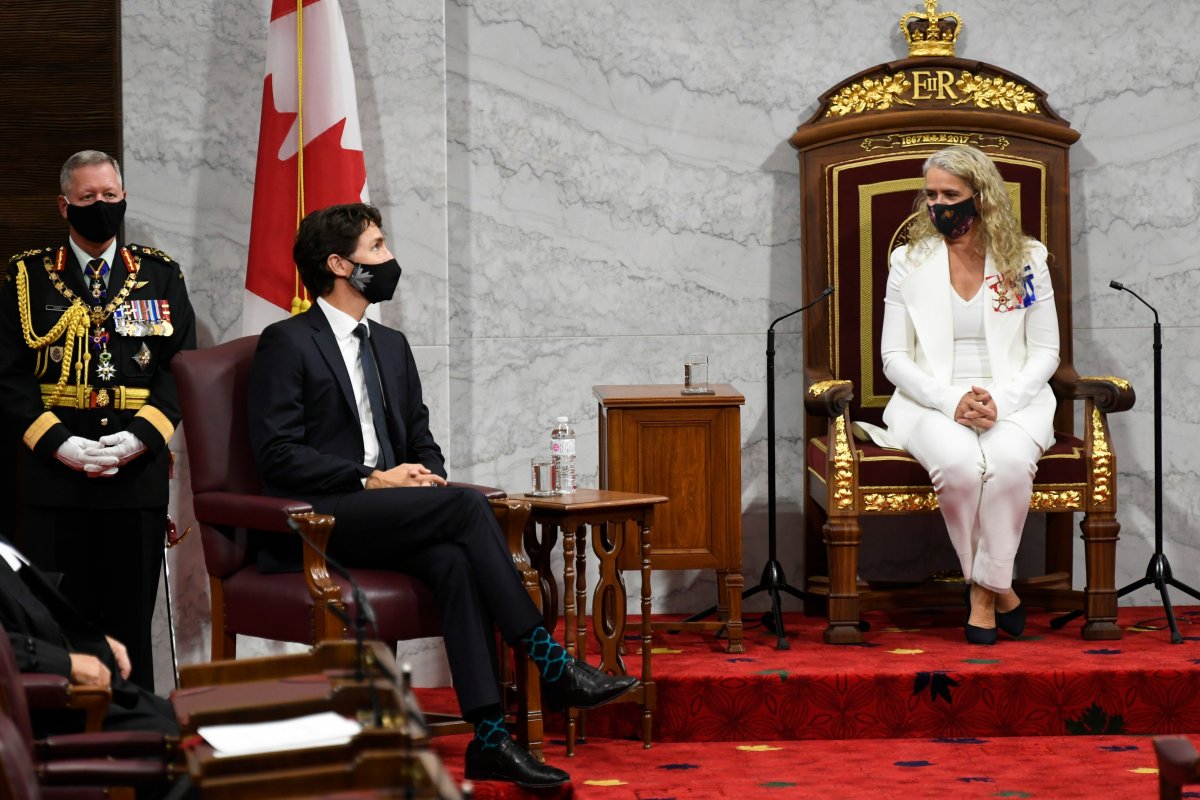Wednesday’s throne speech laid out the governing Liberals’ plans to take Canada through the COVID-19 pandemic, with nods to small businesses, workers, and a promised national childcare plan.

While the topics covered in the speech were a cause for celebration for some, others raised questions and concerns.
Premier Brian Pallister said Thursday “there are foundational issues that must be addressed” that he felt weren’t addressed, adding health care needs more funding.
He praised the co-operation between federal and provincial governments, but said Wednesday’s speech didn’t go far enough.
“The foundation matters,” he said. “I would ask the PM to reflect upon the fact that health care is foundational to our society.”
Pallister also said while he agreed that this is not the time for austerity, it isn’t also the time for “reckless” spending, and cautioned against the feds taking out loans just because interest rates are low.
“Invest on the fundamentals,” he said, like infrastructure and health care.
“Canadians deserve to get health care when they need it,” he said, adding there are half a million Canadians “waiting in pain, waiting in fear” for surgery.
He was also upset he didn’t hear anything about sick pay for those with COVID-19, he said. The province led the charge in asking the feds to mandate two weeks of sick pay for employees.
One announcement in particular — the continuation of the federal wage subsidy into summer of next year — was a highlight for the Canadian Federation of Independent Business (CFIB).
“That has been a really critical support for small businesses, so I think there will be an enthusiasm among many of our small business members,” said CFIB’s Laura Jones.
“We’re still far from recovered in the small biz sector and so supports like that are going to be important.
“Of course, you’ve never going to love everything in a throne speech, but there were a couple of things I noticed that were on the positive side — the focus on jobs … dealing with the pandemic on the health side, but also from the side of the economy and jobs.”
Jones said one of the biggest worries her organizations have is about any potential permanent changes to the employment insurance (EI) system, because those costs are borne by both employers and employees.
She said she’d like to see a broad consultation before any big changes are made.

Aaron Wudrick of the Canadian Taxpayers Federation (CTF) said for his organization, the big questions are surrounding the costs that will accompany Prime Minister Justin Trudeau’s promises.
“The first question for a group like ours is, ‘how are you going to pay for all of this?’
“They didn’t really seem to give any sense of a concern about the price tags on the things they promised. Of course, we didn’t get any numbers — it’s a throne speech, not a budget.
“We’ll have to wait in the coming weeks and months, and they’ll present an economic update, and then we’ll finally get a sense of the bigger fiscal picture.”
Wudtrick said his hope is that emergency spending for the pandemic will eventually come to an end — whether that’s six months or a year from now.
“I think there’s a big buy-in from the public for temporary measures, but there’s a higher hill to climb for permanent programs … for obvious reasons.”
Among the speech’s promises was a proposed national childcare plan — something that was music to the ears of the Canadian Child Care Federation (CCCF)’s Don Giesbrecht.
“The language was really significant for us. We really think it’s bold, we think it’s progressive, we think it shows a recognition of business leaders, of labour, of women of families, and the voice of children,” he said.
“Frankly, it’s saying that childcare — as we’ve known for decades now — is essential to the economy and most certainly is essential to the recovery and restart of our economy in the immediate term, and going forward.”
Giesbrecht said he’s optimistic about the idea of building a sustained, long-term solution to Canada’s childcare woes — in a country that, traditionally, has only had one-off answers and “band-aid” solutions to a complex problem.
“I think today is historic, frankly. We have not heard anything like this for a really long time in terms of boldness and in terms of just the language and the words used.
“We are very optimistic that this will turn into action.”

Although the economy and the impact the pandemic has had on Canadian families’ pocketbooks was front and centre during the throne speech, the plans to combat the virus in the medical arena also arose.
Dr. Raywat Deonandan, a global health epidemiologist and associate professor with the Interdisciplinary School of Health Sciences at the University of Ottawa, told 680 CJOB he also liked what he heard.
The rhetoric is good. I’m old enough to know not to trust the rhetoric until it’s backed up by action. In terms of how the rhetoric matches the pandemic seriousness, it’s appropriate,” he said.
“I like that they’re focusing on testing capacity — that is the logjam right now across Canada. How can we scale up and surge the ability to get tested quickly and accurately and affordably?”
None of the minority government’s big ideas will matter, however, if it gets defeated in a confidence vote as Parliament resumes.
A political science professor at the University of Calgary, however, says that’s unlikely to happen.
Lisa Young told 680 CJOB she took Trudeau’s post-speech address as a ‘warning’ to opposition leaders.
“Do you want to be the opposition leader that causes this government to fall, and takes away Christmas by sending us all to the polls?
“There are huge risks that are entailed in that, and as I was watching the prime minister, it reminded me that he really is in his element being a national leader in this time of crisis, telling people that he understands how hard things are, how hard it is on kids, on families. He’s good at this,” she said.
“It’s not the time, I think, if you’re an opposition leader, that you really want to take him on.”









Comments